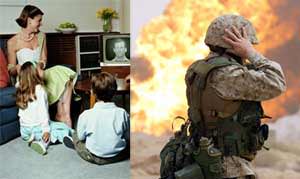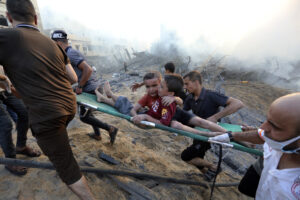Keeping Our Demons at Bay
The Special Forces veteran and author of "Full Spectrum Disorder" explains why the media celebrate true believers such as Lt. Col. Ralph Kauzlarich who continue to fight a war that is already lost.
Last year, I began to research and write on the case of Pat Tillman. One of the central characters in the Tillman story was Lt. Col. Ralph Kauzlarich, who was the regimental executive officer for 75th Ranger Regiment in Afghanistan in 2004 when Tillman was killed by friendly fire. He was also a key figure in the Pentagon’s attempts to first cover up and then spin the fratricide. Kauzlarich was the officer assigned to conduct a second investigation of the circumstances of Tillman’s death. The first investigation — conducted by Capt. Richard Scott — had found criminal negligence and professional incompetence, so a higher-ranking officer was required by law to follow up in the event that a general court-martial would become necessary. Not surprisingly, no one was charged with either crime, though some minor administrative actions were taken, including reassignments out of the Rangers and “letters of reprimand” for two officers. But that is not what this commentary is about. This is about Lt. Col. Ralph Kauzlarich, a Washington Post writer and the power of cultural myths.
In the course of my research, Kauzlarich emerged as an unlikable person, although I admit that I still bear class resentment toward most commissioned officers from my days in the military. My memories are still pretty fresh regarding the cannibalistic promotion system that advanced so many self-important, puffed-up anal-retentives ahead of the few very competent military leaders. Competent, principled officers had a relatively short lifespan in the Officer Personnel Management System.
His rank isn’t the only thing that bothers me. As reported previously on Truthdig, Kauzlarich had made some very offensive remarks about the Tillman family’s agnosticism. Then both Robert Scheer (Truthdig’s editor) and Mary Tillman (Pat’s mom) contacted me on Feb. 26 to tell me that he was back in the news.
David Finkel of The Washington Post had written a 5,000-word feature article on Kauzlarich entitled “11 Days to Baghdad.” It was a scripted account of the 2nd Battalion, 16th Infantry Regiment, of the 1st Infantry Division — Kauzlarich’s battalion — preparing to deploy to Baghdad as part of the Bush administration’s “surge” strategy to salvage the city from defeat. Kauzlarich was featured as the leading man, with his family and the battalion as a supporting cast.
In the opening scene, with the winter storm blowing against the doors of a gymnasium filled with troops in formation and families in the bleachers, Finkel gave Lt. Col. Ralph Kauzlarich one hell of an entrance:
Outside, snow was coming toward this isolated place. Inside, as the bleachers filled and the doors swung closed against the cold, a 41-year-old soldier near the middle of the floor began clapping his hands in anticipation.
And now waved at his wife and children.
And now took his position in front of the soldiers he would soon be leading into combat.
This was Lt. Col. Ralph Kauzlarich, the commander of an Army battalion called the 2-16 — the 2nd Battalion, 16th Infantry Regiment of the 4th Infantry Brigade Combat Team, 1st Infantry Division. The unit has 800 soldiers, most in their late teens and deploying to Iraq for the first time under the command of a man who, in this gymnasium filled with believers, was among the biggest believers of all.
“We are America,” is how Kauzlarich would describe his belief a few days later, just before boarding a plane that would take him and his soldiers for a year’s deployment into the center of an increasingly unpopular war. “This nation can do anything that it wants to do.”
Kauzlarich was a student at West Point when I taught military science there, but I didn’t know him then. The academy is a big place, and the students are all alike — dressed in gray, striding purposefully between gray buildings, through gray snow, alongside the gray Hudson River.
“Gray. Dismal. A very sad place to live,” is how Kauzlarich’s wife, Stephanie, herself a West Point grad, described Iraq in the Washington Post article. If that were the case, the Kauzlarichs may have been flashing back to their student years.
Kauzlarich and I certainly saw each other unknowingly at West Point, somewhere — an ambitious cadet walking past a sergeant first class. I was an authority figure to be avoided. He was en route to obey other authority figures, struggling through each hectic day with his mind focused on a gold bar and a ring.
In my classes there, I had to stick to the subjects. We were training the cadets to pass tests, years ahead of public schools adopting the same prime directive; and training to take tests takes time. But there were occasions when the cadets wanted to know about Vietnam. They were surrounded by Vietnam veterans. Plenty of the officers there told them that America was stabbed in the back by the press, and that the Vietnam War could have been won. I was an NCO, preparing to leave the Army (though I would go back yet again); so I told them what I knew.
We should not have been in Vietnam. The Vietnamese didn’t want us there. That’s why we lost the war.
Nearly 3 million people died in that war. How many more millions of corpses, I said in rebutting the stabbed-in-the-back theorists, would have been required to deliver the “victory”? Sometimes I’d have the time to explain that there are wars where the possibility of winning — as in the surrender of a sword or some such pomp — is nonexistent. In that case neither side wins, but one side loses by not winning. It’s tricky.
Kauzlarich wasn’t in my classes nor among those cadets who dropped by my office to chat.
In The Washington Post article, Kauzlarich is quoted:
“What we’re about to do is going to change every one of our lives. And it’ll all be okay… as long as we win.”
Winning. Kauzlarich muses with Finkel:
“Who will win?” he said, rephrasing the questions. “I will win.”
He thought about his answer.
“Is that belief or confidence?” he asks rhetorically. “Is it confidence, or is it overconfidence? Those are questions I have to ask myself. Because if it’s overconfidence, it’s arrogance.”
He thought some more.
“I will win,” he said again.
I
will win! Me, Ralph Kauzlarich, the star … the leading man.
Back on Earth, however, the war is already lost.
The generals in 1968 told their administration that the United States could not win (and therefore would lose). This assessment was hidden until Daniel Ellsberg outed them. Ellsberg and the generals who kept their mouths shut like good fucking Germans all knew the simplest truth about “winning.” Military success is not predicated on tactical outcomes, but on political ones.
That’s why we have body counts and metrics as the public’s score sheets for lost wars. These are veils draped over the bloody reality of the can’t-win-defeat.
Back on Earth, The Surge™ is an attempt to salvage Baghdad from the general Anglo-American loss of the war. It is based on a puppet government with popular bases that orient toward Iran, a nation whose growing prestige and influence will edge the United States further out of the region. The “allied Iraqi forces” are heavily infiltrated, with many men moonlighting for sectarian death squads. The majority of the Iraqis don’t merely want the U.S. to leave immediately; they approve of armed attacks against American troops and contractors until they do leave. The Iraqi government, which is the last hope of the U.S. ambition to establish a permanent military presence there, is seen by most of the Iraqi resistance as collaborators — the eyes and ears of the occupation — that must be destroyed: a tactical imperative to blind the occupation forces.
In this sense, the single most significant catalyst for inter-Iraqi violence — which is destabilizing the country to the point where the U.S. can never appoint an effective and compliant government (the goal of the war) — is the occupation itself. In effect, the pursuit of the most basic political goal of the war is rendering that goal impossible.
Iraq is what an unacknowledged political defeat looks like. That makes it a military defeat.
We should not have been in Vietnam. The Vietnamese didn’t want us there. That’s why we lost the war. We should not be in Iraq. The Iraqis don’t want us there. That’s why we lost the war.But Ralph Kauzlarich is going to snatch victory from the jaws of defeat, and David Finkel has written Kauzlarich’s pre-deployment hagiography.
In 5,000 words, there is not a single mention of Iraqis except as a government and as “suspected insurgents.” Not one. Yet throughout the article, what is emphasized — in manipulative and melodramatic terms — is the danger of Iraq, the anticipation of danger, the fear of killing and being killed … for the American troops.
The much maligned Lancet report — which actually used a very sound enumeration method — has already shown us that (by now) about 700,000 Iraqis have been killed in this war, almost 2 million displaced, untold numbers wounded — physically and psychologically — and a once vibrant if imperfect society (like we can talk) has been reduced to a sea of terror and misery. Babies live in this.
Kauzlarich and his battalion were sent to Sadr City — a poor area with the population of Brooklyn. What they anticipated was killing. That is what the infantry does — it kills close up. Yet in Finkel’s 5,000 words about one of the leaders in this war — one already tainted by his careerism and his public displays of intellectual mediocrity — there is not a single word about Iraqis.
That’s not to say that the Iraqis aren’t there, in every line of text, in every paragraph, in every turn of phrase. They are there … as the backdrop on the stage, as the amorphous danger against which these young men must undergo their rite of passage into the death-cult of imperial masculinity. And because this othering of the Iraqis is so consistent, so perfectly fitted to existing cultural and entertainment conventions, there is little doubt that Finkel used the Iraqis in exactly this way — as a racialized reduction, as expendable extras on his set.
For this reason, I accuse. David Finkel, no less so than Judith Miller during her apprenticeship under Ahmad Chalabi, is not merely a journalist. He has become part of the war machine. There is blood on his hands, and just as with Judith Miller, Finkel will have to bear that Macbethian stain.
More than once now, I’ve made note of the Bush administration’s affinity for entertainment conventions and scripted performances. These are characteristic of all politicians in this age of mass media, to be sure. But the Bush administration (and more than one generation of Americans) has been immersed in these conventions and performances in an instrumental way. Life has come to imitate art in such a way that the entertainment conventions have become “active ingredients in reality.” Unfortunately, for the Bush administration and the world, the ability to impose a script on the rest of the globe is not the same as being able to control the outcomes. Not everyone is sticking to this script.
The media have assumed a totalizing role in our lives. Evidence of how effective this role has been is the fact that most of us still believe that the “reputable” media (NYT, Washington Post, CNN, etc.) merely reflect (imperfectly) the realities about which they “report.” Yet the Finkel hagiography is a perfect example of fitting a narrative to cultural conventions (especially the conventions of the film script) in ways that actively participate, and invite the audience to participate, in the reproduction of the racism and patriarchy inherent in those conventions. The Safe-World is somewhere in the suburbs, ringed with layers of defense: lawns, fences, homeowners associations, bands of strip malls, interstate highways, contract security, cops, the oceans, the aircraft carriers and nuclear armed submarines….
Outside the layered defenses of Safe-World, surrounding it, are dark, unpredictable, primitive Others. Inside Safe-World, when stability reigns, men can provide and rest at the hearth. But the real rite of passage for Men is to leave the safety of the hearth to confront this Dark Otherness outside Safe-World. Having done their duty disciplining the teeming periphery, they can return to the hearth, where Woman stands by, waiting, appropriately grateful for her security to this bloodied Man. In exchange for his security (also against other men), she is dutiful.
Their camouflage on, their wives carrying infants, their older children carrying flags, the soldiers of George W. Bush’s surge crowded into a gymnasium for their brigade deployment ceremony, a last public viewing before they disappeared into Iraq.
This is the opening sentence in Finkel’s article.
As one of his soldiers said: “He’s the kind of guy you follow to hell and back. He’s that kind of leader.”
There it is. They are leaving Safe-World for Hell, to keep Hell far back from home. Our need to believe this in the face of evidence to the contrary has only increased since 9/11.
“Okay, there’s a reason I’m here,” Kauzlarich said he decided that day, as his parents listened, and his wife, Stephanie, went to get the apple crisp out of the oven, and his 7-year-old daughter, Allie, climbed onto his lap for a hug, and his son Jacob, who was born just after Sept. 11, 2001, slid laughing across the floor on his belly. “I wasn’t afraid of anything from that point on.”
Even Stephanie, herself a West Point graduate and former Army officer, has reverted to the norm. She is dutiful. She tends the hearth while Ralph goes forth into Dark-World (Hell) to maintain the integrity of the layered defenses of the suburbs.
Safe-World is a mythical place and a real one: that is, the norm. It is positively dripping with the prevailing storylines that simultaneously conceal and reproduce real power. This narrative contains a meme cluster readily recognizable to all of us. It just sits there waiting for anyone to tap into its resonant power. As Finkel did. His story is a movie trailer. We’ve already seen the movie, again and again and again. We know how to climb right in. We are an enthusiastic audience, the best kind. We suspend our disbelief … oh, do we ever!
As our cultural distinctions have collapsed under the onslaught of megamerger monoculture, we have seen wholesale uniformity imposed on our constructed environment. All the distinct cultural meanings of past communities have gone under the wheels. But human beings cannot live without meaning.
Meaning-making is a distinctly human need. We are the only species that can see the cosmic abyss that surrounds our incandescent islets of awareness. With the enclosure of Middle America™ into the constructed spaces of the work cubicle, the strip mall and the suburban living room, meaning-hunger is being answered in exactly the same commodified way as actual hunger: with taylorized, mass-produced cultural meanings, disseminated as “entertainment.” Journalism has been swept up in this process, now obliged by The Market™ to be “entertaining.” (Big-money journalism has always been generally obedient; it’s the adoption of glitz that has changed it.)
Life, at last, must imitate art. And with only one monocultural art, we will be truly one in our imitation.
That’s the danger to stability of cultural criticism. It identifies the patterns, mapping and deconstructing them until they are drained of their authority.The durability of these norms and conventions is the constant Nemesis of social change agents. They still think a simple, well-constructed argument should be enough to “change one’s mind,” such a pale linguistic marker for what this proposes. Enough to begin demolishing the foundational structures of one’s entire worldview, and with it every decision taken on behalf of that worldview, every emotional attachment developed within its framework, and every single thing that gives them meaning as a safety rail along the Abyss. The Big Dark-World. Infinity that swallows us up. This is always the preoccupation of those who understand themselves as simply … individuals.
Kauzlarich was filling out something called the Family Contingency Workbook.
I want to be buried, cremated: Buried.
Location of Cemetery: West Point.
Personal effects I want buried with me: Wedding Band.
Yes, he told Stephanie, whom he had met when they were students at West Point and who hadn’t exactly been seduced by his first words to her, which were: “You can call me The Kauz.” That was all he wanted to be buried with.
Type of head stone: Military.
Scripture you want read: Psalm 23.
Music you want played: Something upbeat.
“Ralph, upbeat music?” Stephanie asked.
“I don’t want people to be sad at my funeral,” Kauzlarich said.
This kind of saccharine script is irresistible to the narcissistic personality of our age. Our collective narcissism is the moth; the script is the flame.
Christopher Lasch, in “The Culture of Narcissism: American Life in an Age of Diminishing Expectations,” published all the way back in 1979, concluded (in perfectly predictable patriarchal terms, and with a powerful Freudian inflection) that the narcissism we see in American life is related to the loss of authority of the male. That’s Lasch’s misogyny, of course, so I am compelled to just name it. Nonetheless, Lasch’s description of cultural narcissism had a lot of pearls.
“Success in our society has to be ratified by publicity,” he said.
[A]ll politics becomes a form of spectacle. It is well known that Madison Avenue packages politicians and markets them as if they were cereals or deodorants; but the art of public relations penetrates more deeply into political life…. The modern prince … confuses successful completion of the task at hand with the impression he makes or hopes to make on others. Thus American officials blundered into the war in Vietnam…. More concerned with the trappings than with the reality of power, they convinced themselves that failure to intervene would damage American “credibility”…. [They] fret about their ability to rise to crisis, to project an image of decisiveness, to give a convincing performance of executive power…. Public relations and propaganda have exalted the image and the pseudo-event. (Emphasis added)
This script gets turned on by the likes of “journalists” such as David Finkel, and the public transfers its amorphous fear. We make the classic patriarchal deal writ large, the one expected of infantilized women. We accept the “protection” of the Father-State, and in exchange we offer up … obedience and conformity … even vigilance on behalf of the Father-State. We become dutiful.
Surveillance is established in the prisons, and we accept that. Then the hospitals, and we accept that. Then the factories, the offices, the corner stores … dark danger is ubiquitous. Even in the family.
The beauty of this new Panopticon is not that it simply takes our eyes off the real war, the real plunder, the real system; it is that it stations a pernicious little watcher inside our individual brains. We become aware that we are under surveillance all the time, and this surveillance constitutes not the one discipline of the edict, but the implanted discipline that a complex society requires of its subjects to police themselves.
Finkel is not a dupe, any more than Judith Miller or Wolf Blitzer. They are all active agents of the war establishment. They are collaborators. It is this disciplinary process with which they collaborate. They teach us that Dark-World is real, and there we might be, but for the grace of God and our protectors: the cop, the soldier, the mercenary, the prison guard, the surveillance camera — the rat mentality that urges some of us to police others for conformity.
But suburbia is not safe. This is the central illusion.
While suburbia has had its eyes fixed on threatening images of Arabs and Persians and Latinos and deepest, darkest African America, the same establishment that makes war and builds prisons and gazes into our lives has picked suburban pockets with one hand and gripped the ‘burbs as loan sharks with the other.
Suburbia is not being protected; it is being saved for dessert.
It is this sector with its fragile, technological, disembodied living standard that will now come under attack. In the short term, that is already happening through financial manipulation and the further disappearance of living-wage jobs. The tremendous personal debt burden that is mounting in the American “middle class,” fueled by past low interest rates and cash-out equity loans, was the latest maneuver to prop up this sector’s role as global consumer — a time bomb that will explode directly under Suburbia’s feet.
Meanwhile, the liquidation of the commons — from Medicare to Social Security to public services — constitutes a massive transfer of wealth saved by these working people directly into the speculative money pit that is Wall Street. Suburbanites are workers in the truest sense, even though they seldom stand on the factory floor now. They don’t know it, but they are weak, dependent, high-maintenance workers in a consumer mill.
The bill for the United States from Treasury loans to other nations — already impossible to pay — grows exponentially to support the cost of the military now conducting the war, those we see as the guardians of civilization. Our children are inheriting this impasse. We have witnessed what happens when the suburbanites are fleeced; with the taxpayer bailout of the savings and loan criminals, the Long Term Capital Management hedge fund, these burdens will invoke the “too big to fail” principle. From Chrysler to Enron, the so-called middle class will pick up the tab.
The real threat will not appear as an Arab with a bomb or a 16-year-old with brown skin and a Glock. It is already present. It has appeared as pension funds disappearing in strategic bankruptcies. It has appeared as sub-prime lending and subsequent foreclosures.
“Thank you for buying all these houses,” the banks are already saying. “Now we can take them back and rent them to you.”
As Suburbia works harder and faster to keep up with the mounting debt, as it is forced to further ingratiate itself to Suburbia’s employers, as it learns to kiss more ass, get personality makeovers to fit itself heart-and-soul to the boss, it is obliged first and foremost to purchase the bare minimum of status markers (like stage props) that validate this new personality. To call narcissism in this age a “disorder” is a cruel pun. It is a cultural mandate — the norm.
Outside the ‘burbs, the treatment of the others as Dark-World has become a kind of local self-fulfilling prophecy. Blending of police and military functions corresponds to an increasingly uniform (urban, unemployed, young) and crisis-ridden global human ecology. Nonetheless, the imposition of a garrison state on people who have been previously privileged as a core political base (like Suburbia) is no simple matter.
If an openly warlike state is to impose control without the middlemen, it requires Spectacle as camouflage.
Soldier and SWAT spectacle … soldier and SWAT reality. They are not the same, the spectacle and the reality.
Spectacle conceals reality.
Spectacle requires publicity and amplification.
What better publicity, what better amplifier, than Finkel’s crude reduction of this war to an adolescent docudrama for The Washington Post? Ever since the neocons came to power, most of the so-called reputable press has been so craven in its collaboration with our government that it might as well be assigned a formal position on the Pentagon staff.
The Dark-World set of establishment publicists like David Finkel and political consultants like Karl Rove is like a movie in one other respect. The light you see is on the screen. The story you see is framed in shadow. Remain passive. All will be well.
Your support matters…Independent journalism is under threat and overshadowed by heavily funded mainstream media.
You can help level the playing field. Become a member.
Your tax-deductible contribution keeps us digging beneath the headlines to give you thought-provoking, investigative reporting and analysis that unearths what's really happening- without compromise.
Give today to support our courageous, independent journalists.






You need to be a supporter to comment.
There are currently no responses to this article.
Be the first to respond.